10 Best High-Fiber Veggies to Lose Weight
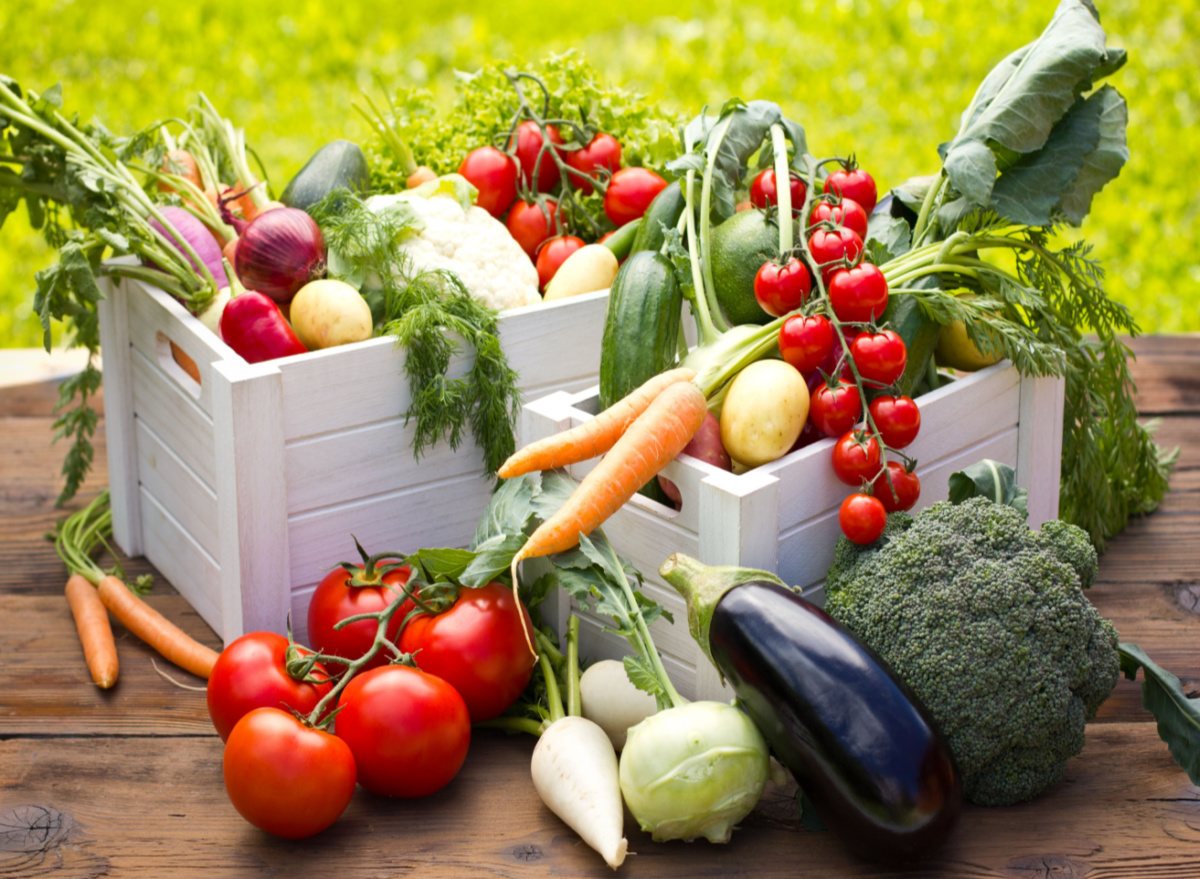
A dietitian unveils the top 10 high-fiber vegetables that support digestive health, reduce disease risk, and support weight loss—all while boosting your overall well-being without the extra calories.
Fiber may not top your list when thinking about the best nutrients for staying healthy. However, fiber is an essential nutrient for digestive health and several aspects of your well-being. Studies suggest that fiber helps regulate bowel movements, reduce cholesterol, and can support weight management by increasing satiety and helping you feel fuller for longer.
While many people think of fiber in terms of grains and cereals, vegetables are often an even better source of this vital nutrient, says the National Institutes of Health (NIH). Incorporating a variety of high-fiber vegetables into your diet can help boost your gut health, lower your chronic disease risk, and aid weight loss. Research consistently shows that eating a fiber-rich diet can your risk of heart disease, stroke, and type 2 diabetes. Plus, vegetables are a perfect way to increase your fiber intake without the excessive calories.
But with the bounty of healthy veggies to choose from, which ones are best in terms of fiber? To find out, we spoke with Chris Mohr, PhD, RD, a registered dietitian and Nutrition Advisor at BarBend, who reveals the top 10 healthiest high-fiber vegetables you can eat. Read on to discover which vegetables to add to your diet for a fiber-fueled life.
Broccoli
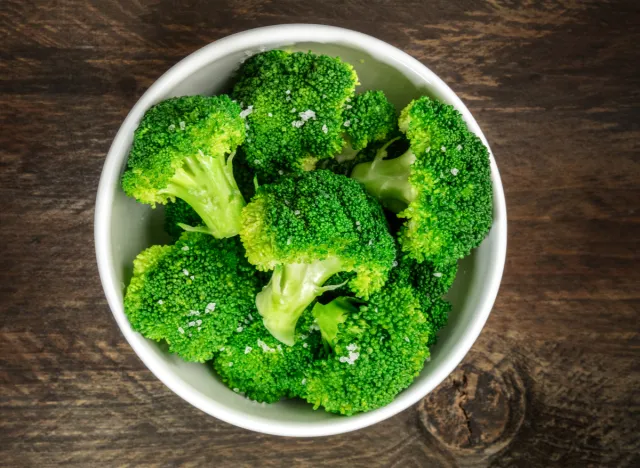
Calories: 15
Fat: 0 g (Saturated Fat: 0 g)
Sodium: 15 mg
Carbs: 3 g (Fiber: 2 g, Sugar: 1 g)
Protein: 1 g
Broccoli is a nutritional powerhouse that offers plenty of health benefits, thanks to its high fiber content and rich array of vitamins and minerals. In addition to being fiber-packed, broccoli is a great source of vitamin C, which research says helps support immune health and promotes collagen production for better skin health. Mohr tells us, “Broccoli contains compounds like sulforaphane, which may have anti-cancer properties, making it a great addition to any healthy diet.”
Broccoli can be steamed, roasted, or added to soups and salads for a fiber-boosting meal.
Carrots
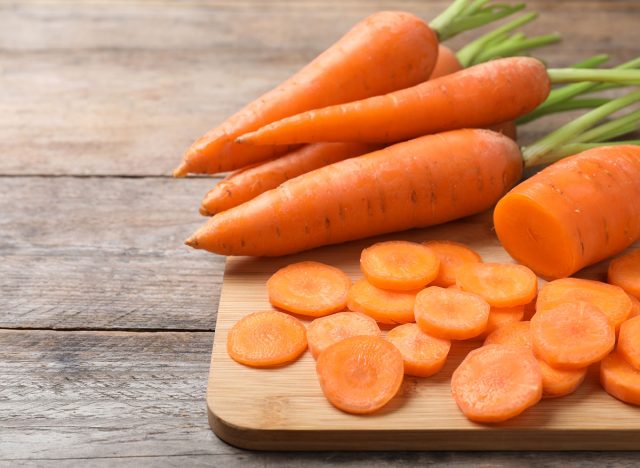
Calories: 30
Fat: 0 g (Saturated Fat: 0 g)
Sodium: 60 mg
Carbs: 7 g (Fiber: 2 g, Sugar: 5 g)
Protein: 1 g
Carrots are an excellent source of soluble and insoluble fiber, which makes them fantastic for supporting digestive health and regulating blood sugar levels. Mohr explains that carrots are also rich in beta-carotene, which converts into vitamin A in the body. According to the NIH, vitamin A is essential for maintaining healthy vision and skin. “Carrots help with digestion and blood sugar stability, making them a great vegetable for those looking to improve their gut health and manage weight,” says Mohr.
Carrots are also versatile, whether eaten raw as a snack, roasted, or added to soups, stews, and salads.
Brussels Sprouts
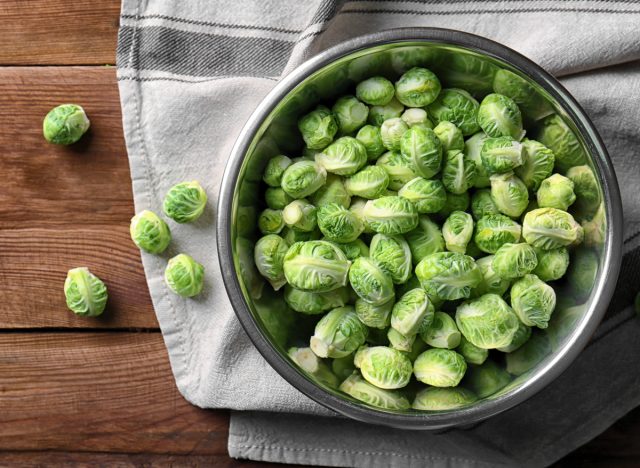
Calories: 35
Fat: 0 g (Saturated Fat: 0 g)
Sodium: 15 mg
Carbs: 7 g (Fiber: 3 g, Sugar: 2 g)
Protein: 3 g
Brussels sprouts, often called mini cabbages, are packed with fiber and antioxidants. One of their main compounds, kaempferol, has been shown to help reduce inflammation, which is crucial for overall health and disease prevention. “Brussels sprouts are an excellent source of vitamin K, which is crucial for bone health, heart health, and proper blood clotting,” explains Mohr.
Brussels sprouts make for an excellent addition to meals, either roasted, steamed, or sautéed, helping to boost digestion and provide a healthy dose of fiber.
Spinach
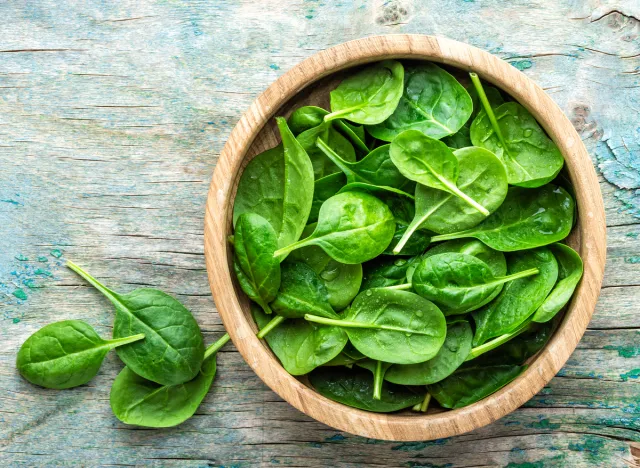
Calories: 35
Fat: 0.5 g (Saturated Fat: 0 g)
Sodium: 341 mg
Carbs: 5 g (Fiber: 4 g, Sugar: 0 g)
Protein: 4 g
Spinach is touted for its iron content, but it also packs a fiber punch. Mohr explains that spinach provides magnesium, which supports muscle function and nerve health, in addition to lutein, an antioxidant that research says can support eye health. “Spinach is a great way to add fiber while also reaping the benefits of vitamins and minerals essential for overall well-being,” says Mohr.
To get more spinach in your life, add it to smoothies, salads, omelets, or sautée it as a side dish.
Artichokes
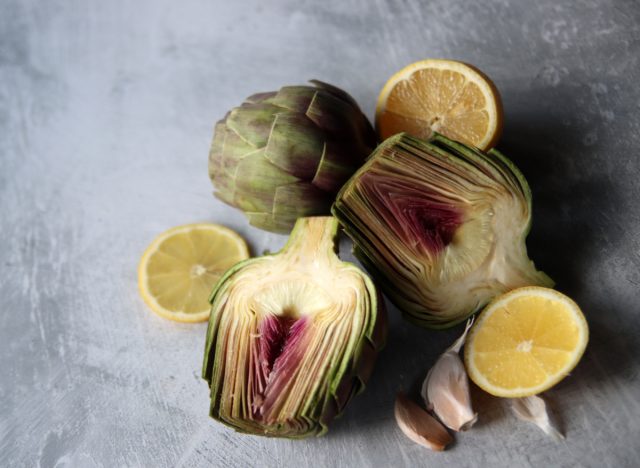
Calories: 45
Fat: 4 g (Saturated Fat: 1 g)
Sodium: 180 mg
Carbs: 2 g (Fiber: 1 g, Sugar: 1 g)
Protein: 1 g
Mohr explains, “Artichokes are rich in antioxidants and prebiotics, which feed healthy gut bacteria and promote digestion.” Additionally, a 2023 study in Antioxidants found that artichokes can support liver health since they contain compounds like cynarin that help detoxify your body. Artichokes can be enjoyed steamed, roasted, or added to salads or blended into sauces.
Cauliflower
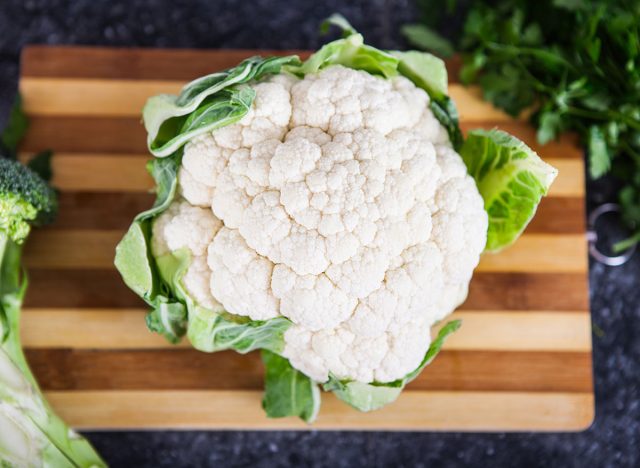
Calories: 15
Fat: 0 g (Saturated Fat: 0 g)
Sodium: 15 mg
Carbs: 3 g (Fiber: 2 g, Sugar: 1 g)
Protein: 1 g
Cauliflower is a low-calorie vegetable that offers about 3 grams of fiber per cup. “Cauliflower is rich in glucosinolates, which may help detoxify the body and protect against cancer,” says Mohr. “It also contains choline, a nutrient that supports brain function.”
Cauliflower is highly versatile and can be used in a variety of dishes, from roasted florets to mashed cauliflower as a substitute for higher-carb mashed potatoes.
Sweet Potatoes
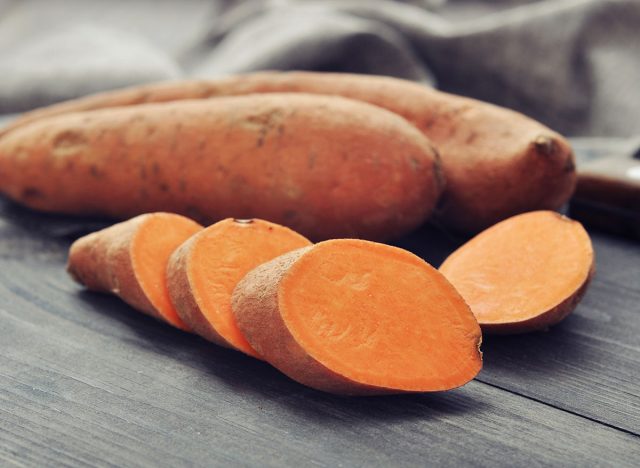
Calories: 80
Fat: 0 g (Saturated Fat: 0 g)
Sodium: 18 mg
Carbs: 19 g (Fiber: 2 g, Sugar: 11 g)
Protein: 1 g
These root vegetables are an excellent source of fiber, with around 4 grams of fiber in a medium-sized sweet potato. Sweet potatoes are also a rich source of beta-carotene, which is converted into vitamin A that offers a host of benefits as noted above. Mohr says, “Sweet potatoes are packed with potassium, which helps regulate blood pressure, making them a great choice for heart health.” The versatility of sweet potatoes allows them to be baked, mashed, or added to stews.
Beets
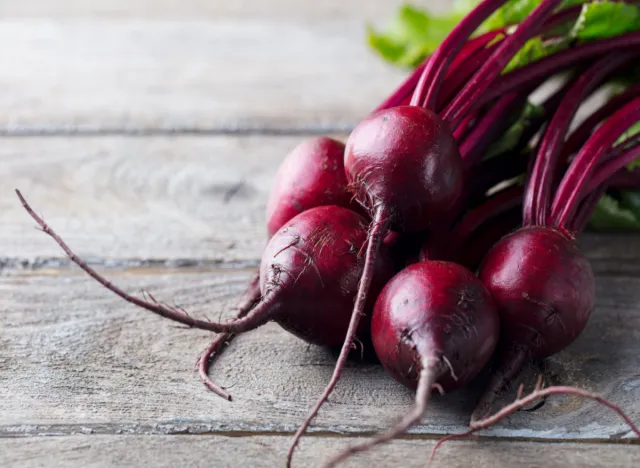
Calories: 40
Fat: 0 g (Saturated Fat: 0 g)
Sodium: 250 mg
Carbs: 19 g (Fiber: 1 g, Sugar: 6 g)
Protein: 1 g
Beets are high in nitrates, naturally occurring compounds made up of nitrogen and oxygen that studies show can improve blood flow and lower blood pressure. “Beets contain betalains, pigments with antioxidant and anti-inflammatory properties that support overall health,” Mohr explains.
Beets can be roasted, pickled, or added to salads, offering a nutritious and fiber-packed option for boosting cardiovascular and digestive health.
Kale
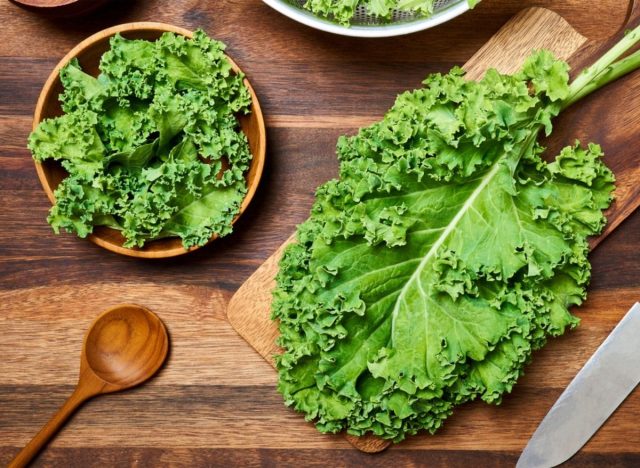
Calories: 49
Fat: 1 g (Saturated Fat: 0 g)
Sodium: 38 mg
Carbs: 9 g (Fiber: 4 g, Sugar: 2 g)
Protein: 4 g
“Kale is filled with vitamins A, C, and K, which support immunity, skin health, and bone health,” says Mohr. “Additionally, it contains powerful antioxidants like quercetin and kaempferol, which help reduce inflammation in the body.” Whether used in salads, smoothies, or baked into crispy kale chips, kale is a fiber-packed way to support your immune system and overall health.
Eggplant
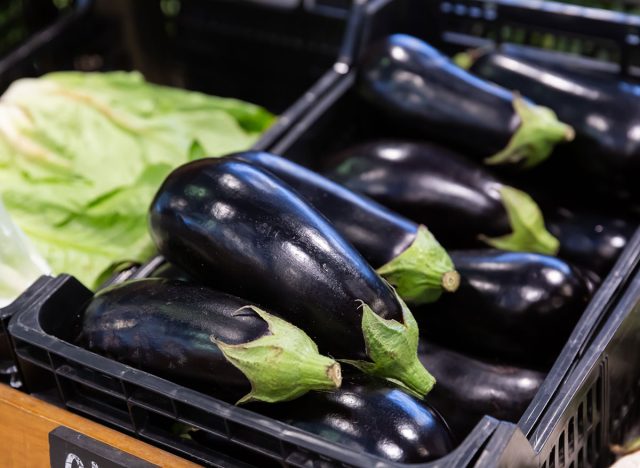
Calories: 45
Fat: 0 g (Saturated Fat: 0 g)
Sodium: 1 mg
Carbs: 11 g (Fiber: 3 g, Sugar: 4 g)
Protein: 1 g
Eggplant is rich in antioxidants like nasunin, which research says can help protect brain cells, support healthy aging, and combat oxidative stress. Mohr explains, “Eggplant is also high in manganese, a mineral important for bone health, and its high water content aids hydration and satiety.” Eggplant has a unique texture, allowing it to be grilled, roasted, or used in stews and curries.